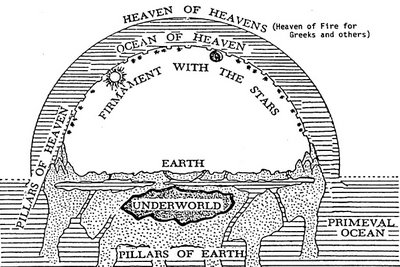more inspiration and accommodation

And God said, "Let there be an expanse/firmament/vault/dome (Heb., 'raqiya') in the midst of the waters, and let it separate the waters from the waters." -Genesis 1:6
“Moses describes the special use of this expanse, “to divide the waters from the waters,” from which words arises a great difficulty. For it appears opposed to common sense, and quite incredible, that there should be waters above the heaven. Hence some resort to allegory, and philosophize concerning angels; but quite beside the purpose. For, to my mind, this is a certain principle, that nothing is here treated of but the visible form of the world. He who would learn astronomy, and other recondite arts, let him go elsewhere.”
- John Calvin, Commentaries on the First Book of Moses called Genesis, 1:6
§
"It is a fundamental misunderstanding of Genesis to expect it to answer questions generated by a modern worldview, such as whether the days were literal or figurative, or whether the days of creation can be lined up with modern science, or whether the flood was local or universal. The question that Genesis is prepared to answer is whether Yahweh, the God of Israel, is worthy of worship. And that point is made not by allowing ancient Israelites to catch a glimpse of a spherical earth or a heliocentric universe. It is wholly incomprehensible to think that thousands of years ago God would have felt constrained to speak in a way that would be meaningful only to Westerners several thousand years later. To do so borders on modern, Western arrogance. Rather, Genesis makes its case in a way that ancient men and women would have readily understood--indeed, the only way."
- Peter Enns, Inspiration and Incarnation, p. 55
I just thought it'd be good to give some more examples of the affinities between Calvin's doctrine of divine accommodation in Scripture and the uses to which Calvin put this doctrine and examples of the uses to which Enns has put his incarnational analogy. Enns may have done some slightly different things with Genesis than did Calvin. Of course he did. Calvin didn't have available the ancient near eastern literature to set Genesis in its historical and literary context whereas we and Enns do. But isn't it obvious that there are at least striking, even familial, resemblances between Enns' approach and Calvin's here?




